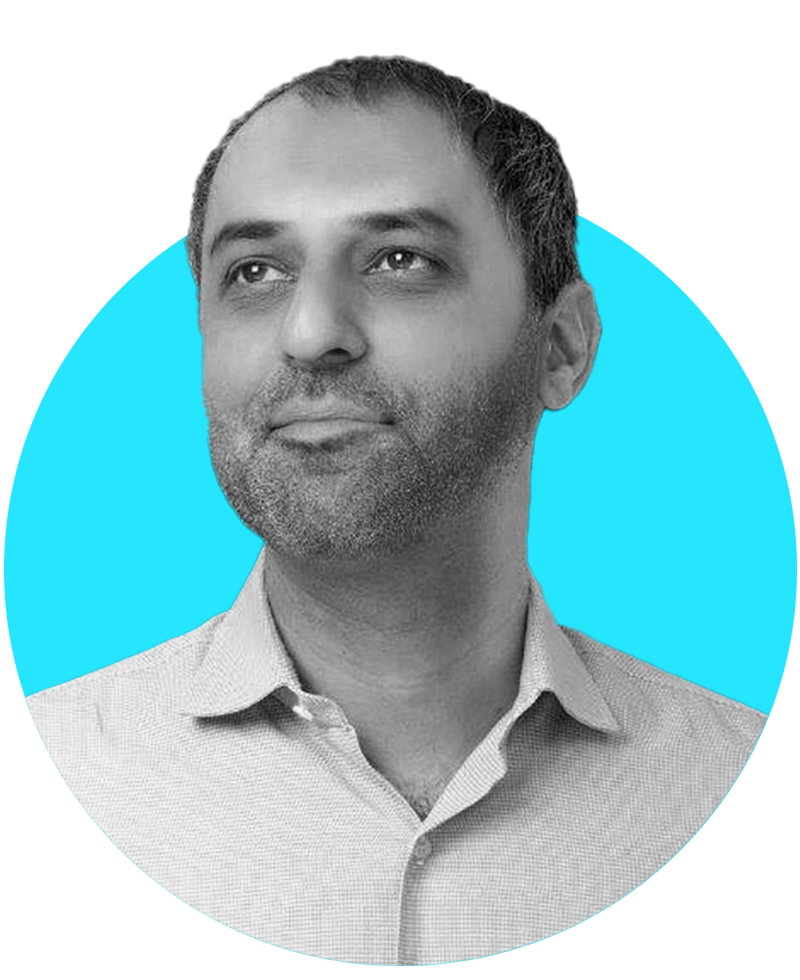
Business leaders are in no doubt that AI has the potential to replace rank-and-file workers. A recent survey of senior executives by YouGov has found that 44% think that the technology is already able to perform certain tasks at least as well as humans can, while IBM’s CEO, Arvind Krishna, has paused hiring for 7,800 jobs that he believes could soon be replaced.
But what about their own roles? Are these at risk from automation too? With many years of C-level experience in US blue-chip firms – including a stint at McDonald’s as the first chief digital officer of a Fortune 500 company – Atif Rafiq is more qualified than most to provide an answer.
Now an influential management thinker and author (in April he published Decision Sprint: the new way to innovate into the unknown and move from strategy to action), Rafiq believes that the CEO’s role is ripe for disruption.
“There’s potential for an internal AI system to function as the ‘brain’ of an organisation,” he says. “But whether the CEO role gets replaced or simply evolves is open to debate.”
Atif Rafiq’s career highlights

2021-present: board member
2019-21: president, customers, commercial and growth
2017-19: CDO and global CIO
2013-17: global CDO and senior vice-president
2011-13: general manager, Kindle direct publishing
AI-enabled decision-making
One business that’s already has drawn a definitive conclusion on this debate is NetDragon Websoft. The Chinese video game producer broke new ground in August 2022 by replacing its CEO with an “AI-powered virtual humanoid robot” called Tang Yu. Describing the move at the time, the firm’s chairman, Dejian Liu, said that he thought AI was the “future of corporate management”.
Although NetDragon Websoft’s share price increased after the announcement, many observers dismissed the move as little more than a PR stunt. But Rafiq believes that there is potential for AI to overtake the CEO as the top decision-maker in business.
“It seems like a gimmick at the moment, but all the building blocks are being created that could make this a reality,” he says. “We’re likely to face this disruption within 10 years.”
As the most senior executive in an organisation, the CEO sets the direction of the business and often has the final say on new initiatives. Rafiq, who sums up this role as “managing the collective intelligence of the organisation”, views the key responsibility of the CEO as “ensuring that your people are thinking about problems in the right way”.
This duty is mostly done by holding numerous meetings with departmental chiefs, which he believes is an unnecessarily cumbersome procedure.
“Important initiatives do deserve time and attention from the CEO, but it would be much better if this process could be streamlined,” Rafiq argues. “AI is better than humans at identifying patterns, so we should be looking for places where we can tap into this technology to help us determine which areas of the business need more attention.”
He believes that AI is likely to “change business leaders’ lives in remarkable ways. This is not a threat to the right CEOs. It’s going to be a golden era for those who are comfortable with using AI. This is going to increase the velocity of decision-making – it’s time to buckle up.”
How AI can power business innovation
Rafiq notes that working out how best to use AI at the strategic level is a challenge that firms will have to solve, but he can suggest a few useful areas on which they might choose to focus initially.
He points to a recent case in which a friend’s company used ChatGPT to help it decide whether or not to use TikTok to acquire new customers. The chatbot can be asked questions such as what the best social media strategies are, who is using a given network and whether it’s likely to be a cost-effective marketing platform. By using the large language model during this initial research stage, the firm felt informed enough to press ahead with the initiative a couple of days earlier than it would have done otherwise.
AI is going to increase the velocity of decision-making – it’s time to buckle up
Rafiq claims that using this fledgling tech could have accelerated the decision-making process on every project he has worked on.
“Ideas are abundant in companies. It’s much harder to identify which of them are likely to work,” he says. “ChatGPT does produce inaccuracies, so it still needs to be filtered. But, if you can speed up the fact-finding process and get to the key factors that could influence whether an idea sees the light of day, that could help companies to be more innovative.”
One factor that’s holding back the adoption of tools such as ChatGPT for these tasks is their public nature. JP Morgan, Verizon, Accenture and Samsung are among a growing number of firms that are restricting the use of generative AI because they are concerned about the data security implications of feeding sensitive commercial information into third-party software.
Rafiq believes that “the real change will come when private versions of ChatGPT and Google’s Bard are made available for businesses”. A secure private AI system will also be able to collate information that’s specific to the organisation to inform its answers.
AI as a knowledge retention tool
This would address another problem that businesses have historically struggled with: the exodus of institutional know-how when experienced employees leave the organisation.
“We shouldn’t have to rely on the fact that there’s one person who knows everything about the business simply because they‘ve been around the longest,” he says. “Generative AI’s ability to work in natural language makes it well placed to replace this capability in a company.”
As AI becomes more integrated with organisational decision-making, Rafiq foresees a future in which it will be normal for businesses to bring the tech into every meeting.
“When I was at Amazon, we had a habit during meetings of leaving one chair in the room open for the customer. It meant that we’d always have them in mind when discussing new ideas,” he says. “Now we’re entering an age where businesses will be leaving one chair open for AI.”
To any business leader who is anxious about the risks posed by this technology and its rapid advances, Rafiq has one simple question: “If it can help organisations learn faster and find the right solutions more quickly, why wouldn’t you want to tap into that capability?”

Business leaders are in no doubt that AI has the potential to replace rank-and-file workers. A recent survey of senior executives by YouGov has found that 44% think that the technology is already able to perform certain tasks at least as well as humans can, while IBM’s CEO, Arvind Krishna, has paused hiring for 7,800 jobs that he believes could soon be replaced.
But what about their own roles? Are these at risk from automation too? With many years of C-level experience in US blue-chip firms – including a stint at McDonald’s as the first chief digital officer of a Fortune 500 company – Atif Rafiq is more qualified than most to provide an answer.
Now an influential management thinker and author (in April he published Decision Sprint: the new way to innovate into the unknown and move from strategy to action), Rafiq believes that the CEO’s role is ripe for disruption.
